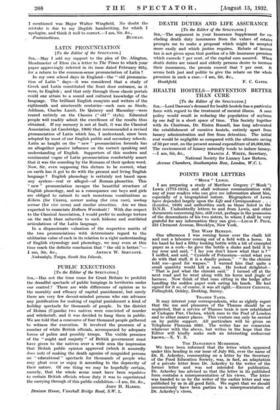LATIN PRONUNCIATION [To the Editor of the SPECTATOR.] SIR,—May I
add my support to the plea of Dr. Alington, Headmaster of Eton (in a letter to The Times to which your paper approvingly referred in its issue dated February 8th), for a return to the common-sense pronunciation of Latin ?
In my own school days in England—the " old pronuncia- tion of Latin " days—it was considered that a study of Greek and Latin constituted the front door entrance, as it were, to English ; and that only through those classic portals could one attain to a sound and cultured knowledge of the language. The brilliant English essayists and writers of the eighteenth and nineteenth centuries—such men as Steele, Addison, Charles Lamb, De Quincey and Macaulay—were reared entirely on the Classics (" old " style). Educated people will readily admit the excellence of the results thus obtained. If my memory is not at fault, it was the Classical Association (at Cambridge, 1908) that recommended a revised pronunciation of Latin which has, I understand, since been adopted by most of our English public and secondary schools.
Latin as taught on the " new " pronunciation formula has
an altogether passive influence on the correct speaking and understanding of English. Supporters of this modern and continental vogue of Latin pronunciation comfortably assert that it was the sounding by the Romans of their spoken word. Now, Sir, even supposing this dictum to be correct, what on earth has it got to do with the present and living English language ? English phonology is certainly not based upon any system—real or alleged—of Roman phonetics. This " new " pronunciation ravages the beautiful structure of English phonology, and as a consequence our boys and girls are obliged to submit to such monstrous vocalizations as Kikero (for Cicero), weewer wokay (for viva voce), weekay wersar (for vice versa) and similar atrocities. Are we then expected to enunciate Holborn Weerdookt ! With due respect to the Classical Association, I would prefer to undergo torture on the rack than subscribe to such hideous and mutilated articulations of the Latin language.
In a dispassionate valuation of the respective merits of the two pronunciations with determinate regard to the utilitarian value of each in its relation to a right understanding of English etymology and phonology, we may even at this time reach the definite conclusion that " the old is better."—






























 Previous page
Previous page